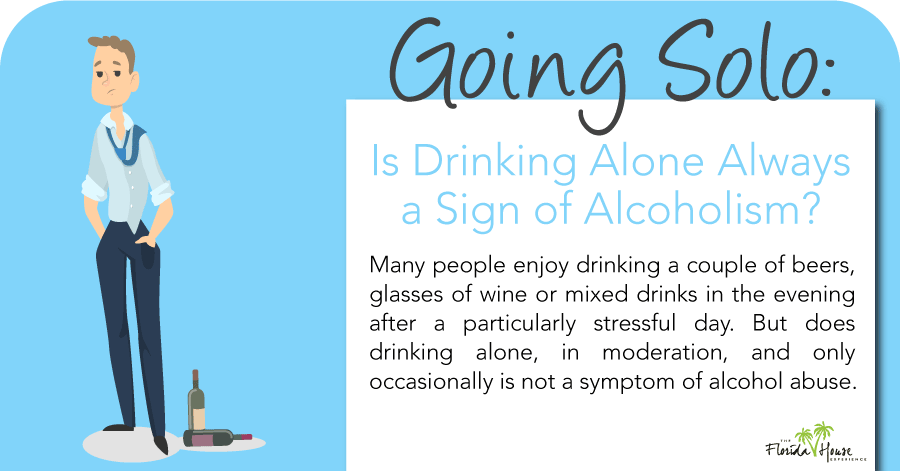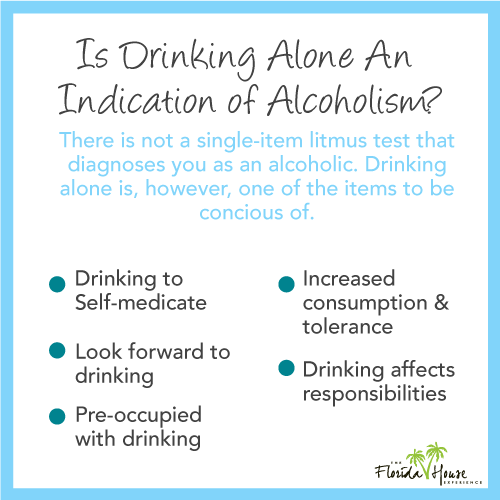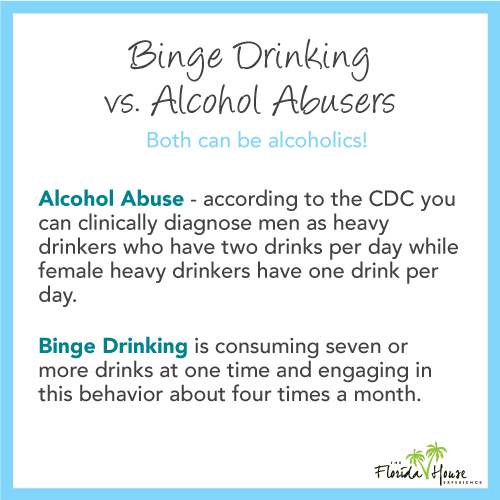
Does Drinking Alone Mean You’re an Alcoholic?
Drinking alone in moderation and only occasionally is not a symptom of alcohol abuse. Many people enjoy drinking a couple of beers, glasses of wine or mixed drinks in the evening after a particularly stressful day. The myth that drinking alone means you have an alcohol abuse problem is an old stereotype from the early 20th Century when a vociferous group started the temperance movement and insisted alcohol was the devil’s drink. In fact, they were so persuasive that President Warren Harding passed the Prohibition Act of 1920, making the possession and consumption of alcohol a federal offense.
When Does Drinking Alone Become an Alcohol Abuse Problem?
 Drinking alone, whether at home or at a bar, is not a cause for concern unless someone:
Drinking alone, whether at home or at a bar, is not a cause for concern unless someone:
- Drinks to self-medicate against depression, anxiety, other serious psychological problems or physical pain
- Looks forward to drinking alone after getting off work
- Thinks regularly about drinking while performing daily tasks
- Consuming alcohol steadily increases, for example, going from two beers or mixed drinks to a couple of six-packs of beer or more than two mixed drinks.
- Drinks so much in the evening that they start being late for work or miss work entirely. If someone is fired because they miss so much work due to drinking alone, they definitely have an alcohol abuse problem
Experiencing withdrawal symptoms is another sign that drinking alone may have evolved into a full-blown alcohol addiction. As tolerance to alcohol’s physical and psychological effects increase, withdrawal symptoms like anxiety, a racing heart, insomnia, aching joints and nausea force drinkers to reach for the bottle for relief.
What are the Dangers of Solitary Drinking?
Alcohol Poisoning
Alcohol abusers who drink alone at home are at risk of suffering alcohol poisoning, unconsciousness and choking after they pass out and vomit. Alcohol poisoning can also cause seizures and brain damage due to lack of oxygen reaching the brain.
Depression and Alcohol
People often drink to suppress overwhelming feelings of depression and anxiety. However, studies indicate that alcohol may increase depressive thoughts and suicidal ideation, especially when the person is drinking alone.
Although alcohol makes some people talkative and uninhibited, it is actually a central nervous system depressant affecting the brain in ways similar to anxiolytics. By initially raising and then dramatically reducing levels of serotonin and other neurotransmitters related to mood and emotion, alcohol can worsen depression and increase the risk of suicide attempts.
Deciding to Drive Drunk
Having one beer or glass of wine by yourself before going to bed is fine. Binge drinking alone and impulsively deciding to drive to your favorite bar is not fine. Drinking with others reduces your risk of driving while intoxicated because a group generally chooses somebody to be the designated driver. Drinking with a group of friends at someone else’s home also means you have a place to sleep it off without worrying about getting home until you are sober.
Does Drinking Alone Cause an Addiction to Alcohol?
 Like drug addiction, alcoholism is a biopsychosocial disease influenced by genetics, pre-existing psychological problems and environmental factors. Individuals who abuse alcohol share a constellation of characteristics that significantly increase their risk of eventually needing alcohol addiction treatment. For example, studies have found that adult alcoholics typically:
Like drug addiction, alcoholism is a biopsychosocial disease influenced by genetics, pre-existing psychological problems and environmental factors. Individuals who abuse alcohol share a constellation of characteristics that significantly increase their risk of eventually needing alcohol addiction treatment. For example, studies have found that adult alcoholics typically:
- Start drinking heavily as teenagers
- Were raised in dysfunctional homes that included alcoholics or drug addicts
- Have suffered life-long problems with low self-esteem, depression, poor decision-making and identity issues
- Have at least one alcoholic parent or guardian
- Have been diagnosed with borderline personality disorder
Genetic and Environmental Factors in Alcoholism
Geneticists recently discovered certain genes that increase a person’s risk for developing an alcohol problem, indicating alcoholism may be a hereditary disease with its emergence depending on whether these genes are turned on by biopsychosocial factors affecting the person’s life.
In other words, you may have inherited alcoholic genes but are not an alcoholic because you were not exposed to specific factors known to increase the risk of abusing alcohol. It also must be emphasized that no one is immune from the chemical dependency of alcohol abuse. Although some are more susceptible to alcoholism than others, anyone’s body can become dependent on the regular introduction of alcohol to their system.
What Is the Difference Between Binge Drinkers and Alcohol Abusers?
According to the Centers for Disease Control, men who are clinically diagnosed as heavy drinkers have two drinks per day, while female heavy drinkers have one drink per day. True alcoholics typically have at least four drinks per day and suffer withdrawal symptoms unless they can continue drinking their usual amount of alcohol. As tolerance builds, the person needs to drink more to achieve the level of inebriation necessary to stop the nausea, tremors and agitation caused by physical and psychological dependence on alcohol.
Binge drinkers often drink alone because they do not want family or friends to know how much they drink. The CDC defines binge drinking as consuming seven or more drinks at one time and engaging in this behavior about four times a month. Binge drinkers do not drink every day, but when they do drink, they often become extremely intoxicated and have encounters with law enforcement involving disorderly conduct, public intoxication or drunk driving. More men indulge in binge-drinking episodes than women.
How Do You Get Help When Drinking Alone Becomes an Addiction?
Alcohol addiction recovery programs offer medical detoxification, personalized assessments, counseling, and a variety of psychotherapeutic techniques to help alcohol abusers address their unique emotional and physical needs.
After completing an alcohol detox, psychiatrists at recovery facilities evaluate patients to determine the severity of their psychological problems, such as depression, anxiety, PTSD or more serious mental health disorders. When someone is drunk nearly all the time, their intoxicated state works to conceal mental illnesses that a family physician may not be trained to detect. That’s why it is essential for alcohol abusers to receive professional treatment at a comprehensive addiction treatment center.
Overcome Alcoholism With the Help of FHE Health
An alcoholic should never try to stop drinking alone. Going cold turkey can cause serious health issues ranging from severe, flu-like symptoms, dehydration from profuse vomiting, organ failure, convulsions, and suicidal thoughts. Alcohol withdrawal syndrome is a potentially life-threatening medical emergency best treated with experienced medical supervision and medications meant to reduce symptoms.
If you or someone you love frequently drinks alone or is abusing alcohol, please call FHE Health today to learn how we can help you or your loved one overcome alcoholism with evidence-based treatment programs and the ongoing support of people who truly want to see you succeed.






